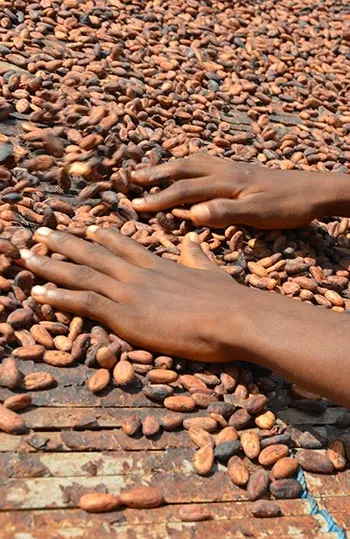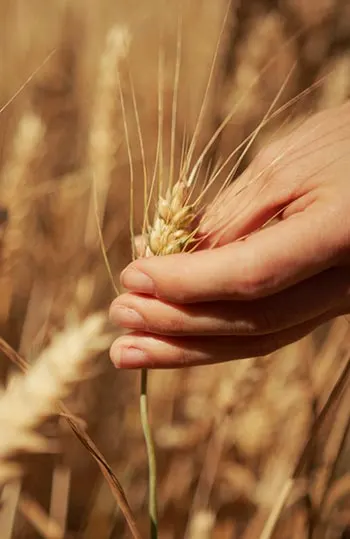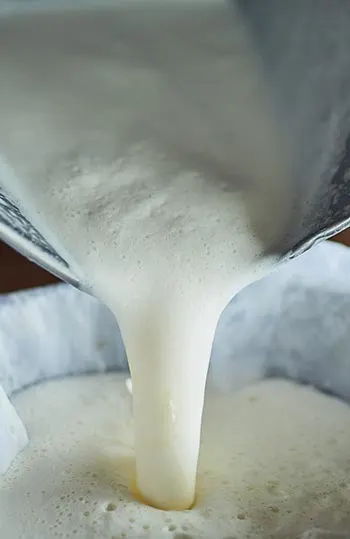MORE SUSTAINABLE INGREDIENTS
A more sustainable supply of key raw materials such as cocoa, wheat, dairy, and palm oil is critical to the continued growth and success of our business, to the resilience and prosperity of the communities producing these raw materials, and to the protection of the landscapes where ingredients are grown.
More sustainable production of our key ingredients also contributes to our carbon footprint reduction goals while helping protect biodiversity. As a global snacking leader dedicated to making snacking right, we are determined to lead in helping to drive sector-wide transformation for more sustainable sourcing at scale.
OUR AIM* | 2024 Performance |
|---|---|
100% cocoa volume for chocolate brands sourced through Cocoa Life by 2025 | 91% |
Maintain 100% palm oil volume Roundtable on Sustainable Palm Oil (RSPO) certified | 100% |
100% cage free eggs globally by 2027 (excluding Russia, Ukraine & Vietnam) | 66% |
Dairy supply sourced from suppliers with formal animal welfare standards | 67% |
100% wheat volume needed for Europe business biscuits production grown under the Harmony charter by 2022 | 100% |
*We aim to regularly and transparently report our progress. You can find additional details on our goals within the About This Report section of our 2024 Snacking Made Right ESG Report.
Agricultural Supply Chain
Our global food system is facing numerous challenges that are weighing down on individual farmers and the land they use. These challenges are complex and call for solutions that require coordinated efforts by governments, industry and scientific, social and environmental experts. Smallholder farming communities in particular need support to increase their resilience. We’re working to build a thriving ingredient supply chain to ensure sustainable supplies of high-quality cocoa, wheat and other raw materials to create our delicious snacks—chocolate brands like Milka, Cadbury and Côte d’Or; or Oreo and LU biscuits. We are using our reach and global presence to work together with outside experts to give farmers a voice. Our signature programs, Cocoa Life and Harmony Wheat, aim to make a positive impact on the farms, communities and environments where our main raw materials are grown. We are also addressing key areas where we can have the most impact, requiring more transparency, and collaborating with our key suppliers and others to promote widespread change so that sustainability becomes the normal way to do business in key raw materials.

At Mondelēz International, we are passionate about chocolate. Cocoa is the essence of our chocolate and vital to our business, so we ensure it is “made right.” Making it right means tackling the complex challenges that cocoa farmers face. That is why we created Cocoa Life. Just as the Cadbury brothers did more than 100 years ago, we work on the ground, hand-in-hand with the men and women who make their living from cocoa across six cocoa-growing countries: Ghana, Côte d'Ivoire, Indonesia, Dominican Republic, India and Brazil. Through Cocoa Life, we are creating a movement for lasting change, rooted in deep understanding through sector-wide collaboration and partnership. We co-create solutions to make cocoa farming a business of choice and to build communities that take on their own development while conserving the natural resources. Together, we grow opportunities. When our consumers choose chocolate with the Cocoa Life logo, it means everyone can love our chocolate as much as we do— because it’s made the right way protecting the planet and respecting the human rights of people in our value chain.
Learn more at cocoalife.org.

Harmony Wheat
As the world’s largest biscuit producer, we’re on a mission to make sure the wheat we use is grown with the environment in mind. Working with farmers, local organizations, and governments, we are changing the way wheat is grown by improving local conditions and farming systems.
Our European Harmony program is a key part of this strategy, working with our local farmers and partners across Europe to help create a world where the wheat for our well-loved biscuits is grown in thriving and biodiverse environments, protected for generations to come.
Harmony Wheat
Wheat is the number one ingredient in our biscuits, so as Europe’s largest baker, we believe it is critical for us to play a key role in tackling the biggest environmental challenges in wheat farming through a robust approach rooted in Regenerative Agriculture. Regenerative Agriculture aims at restoring the natural rhythm of our ecosystem by rebuilding soil fertility and thus improving carbon sequestration; by protecting and enhancing biodiversity and by fostering the social and economic well-being of farming communities.
Co-created along the wheat supply chain with farmers, cooperatives, and millers - as well as agronomists, environment specialists and NGOs - the Harmony program seeks the commitment of local farmers to follow sustainable practices in the growing and processing of wheat. These practices aim at mitigating climate change and reversing biodiversity losses by reducing greenhouse gas emissions and promoting biodiversity actions at farm scale for overall wildlife, including pollinators.
The Harmony program started in 2008 with just a handful of farmers in France, and today collaborates with more than 1,300 farmers in 7 countries in Europe (Belgium, the Czech Republic, France, Hungary, Italy, Poland and Spain). Over the past 15 years, its scale combined with its local partnership approach, has made it unique and we’re proud of our achievements. Currently, ~98% of the volume of wheat needed to produce our biscuits across our European business was grown under the Harmony charter*.
And thanks to the biodiversity practices within the Harmony charter, the surface of melliferous fallows was multiplied by four over the last decade, reaching over 1,800 hectares in 2022.
Our European biscuits brands such as belVita or Milka, as well as our iconic local heritage brands such as LU (in France and Benelux), Oro (in Italy) and Opavia (in Czech Republic) now produce most of their biscuit references with more sustainable Harmony wheat.
The Harmony program has developed a strong and unique data reporting system on farming practices, ensuring full traceability from wheat field to plant. External Harmony audits are conducted among Harmony partners every year by independent and certified organizations such as SGS and Bureau Veritas, to guarantee compliance with the Harmony Charter.
The Harmony program for more sustainable wheat production supports Mondelēz International’s commitment to reducing our end-to-end environmental impact and links to our overall purpose of Snacking Made Right. It is our goal to grow 100% of the wheat volume needed for its European biscuits production under the expanded Harmony Regenerative Charter by 2030*.
You can find out more about our Harmony ambition by watching the video below:
*European Business Unit; excluding portfolio manufactured in newly acquired plants

We remain focused on sourcing palm oil more sustainably – from protecting human rights to working toward our aim of seeking no deforestation across our primary commodities.
When produced and sourced responsibly, we believe palm oil has the potential to benefit people and nature, thanks to its high efficiency and contribution to socioeconomic progress in the rural locations where it is grown. Our Palm Oil Action Plan (POAP) sets out our broad approach to realizing this potential, working with our suppliers and through industry-wide transformation. Since publishing the plan in 2014, we have worked within our supply chain, with our suppliers’ supply chains and across industry to help accelerate improvements. Read more about our sustainable efforts with our palm oil supply chain.
Milk and other dairy products are important ingredients for our cheese and chocolate products. Since 2013, sustainability projects all over the world are coordinated by the Dairy Sustainability Framework (DSF), the dairy sector’s program to align, connect and demonstrate continuous improvement in sustainability. In Europe, we built our sustainability agenda by working with key suppliers and national initiatives on a principle of continuous improvement. In Germany, we supported the development of a new voluntary Quality Milk Standard and implemented it in 2016. And across Europe, we are engaging all of our milk suppliers to build their sustainability roadmaps. We track progress according to the proportion of our dairy ingredients sourced from recognized industry standards.